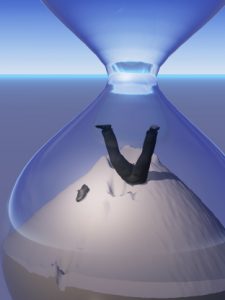The Relaxation Response reverses the negative effects of the sympathetic nervous system which prepares the body for the flight or fight response. The body during stress infuses the body with an increase of adrenaline and other hormones which raise blood pressure, increase heart rate, increase breathing and tighten muscles for reaction. These effects are not good long term, nor are they needed for modern day stress at home or in the office or on the work floor. The Relaxation Response reverses these issues. Meditation Instructors can also help one learn how to elicit this response.
Studies have also shown, when combined with the Faith Factor, the response can also help with a myriad of health and mental issues. The Faith Factor, or belief in anything, is key to eliciting greater benefit from the Relaxation Response. Again, understand, that any attempt to improve health without discussion with a primary physician is not safe. The Relaxation Response can help, but it should never completely replace medications without physician approval. Many of the natural reactions within the body from the Relaxation Response and Meditation follow many of the same principles of medications used to decrease anxiety but without the side effects. So in time, with physician approval, many medications may possibly be reduced.

One problem many have is insomnia and this is the primary focus of this short blog in regards to how the Relaxation Response and a trained Meditation Instructor can help with the inability to sleep.
The anxiety cycle plays havoc on the mind and hence also the body. Only until the anxiety cycle is broken can the mind find peace. This is one of the biggest problems with the inability to sleep. Individuals are bombarded with intrusive thoughts or worries from the day. They prevent the body from calming and instead create a cycle of anxiety which induces stress and the stress response upon the body. The reality is many intrusive thoughts or problems cannot be resolved late at night nor does the body have the capability without rest to properly deal with these issues. Many of these issues seem less important upon waking and the worry of the previous night merely clouds the mind the next day.
Individuals turn to medication to try to overcome the anxiety cycle. They look for over the counter medications that relax the body. The Relaxation Response, however, elicits the same mechanisms within the body. It breaks the anxiety cycle and ushers in the soothing effects of peace and relaxation without the side effects. When using the Relaxation Response to illicit sleep the aim is quite different than using this meditation during the day. Its aim is not so much to produce a meditative response but a sleeping response. In this reality, the brain waves will not be the same as if meditating during the day, but will in fact, merely fade into sleep into meditative trance. This is fine but is a different end.
The Faith Factor is also important in delivering the ultimate responses one may be seeking. If one merely routinely utilizes this response in a mundane and insincere way, then the results will be not as beneficial. It will become mechanical in nature and more of a chore. Instead, be utilizing one’s faith, the response becomes stronger. Due to this, Christian, Muslim, Jew, Hindu, Buddhist, or even atheist can utilize this faith factor by choosing the repetitive word to focus on one’s tradition. All traditions universally tap into the Relaxation Response via the power of faith. For an atheist or non religious, that word may be about family, country or self. It still can elicit the response if the word and motive means something to the person. Likewise, if the word chosen is too Eastern, then a Christian may feel stressed using that term and be counter productive. Instead, it is important to turn the meditation into a prayer as well to enhance the natural response of the body.
In regards to insomnia, or any other ailment, a passive mind is required during meditation. While your focus, desire and goal is sleep, your passive mind remains open to merely the meditation. Some may consider this counter productive, but the moment one starts to think about ” Why am I not asleep” or “How long will this take”, then one creates a new anxiety cycle which reduces the ability of the body to relax and internally heal. So with illness, or insomnia, to curtail the maximum results of desired results, we must in some way not desire it but allow the flow of peace to do its thing. The moment, one focuses more on performance outcome over the process itself, then the ability to fall asleep becomes harder to achieve.

In utilizing the Relaxation Response, one should follow the basic guidelines. First, find a quiet place. In regards to insomnia, this is your bed. Sound makers, or any natural sounds that are not distracting can help one find a natural pace. Second, close one’s eyes and began to reduce muscle tension. Focus on parts of your body and work your way systematically, such as starting from a toe to the next toe and up the foot to up the leg. Stretch and allow the body to naturally relax. Third, start to breath in and out. This step actually can be used while your reducing muscle tension. Fourth, focus on your word, usually a word associated with religious or personal conviction. The word or phrase should be short enough to match the rhythm of your breathing. If Jewish, the word could be Shalom, if Islamic, the word could be Allah, or if non religious, one could utilize word that motivates oneself. Christian usually choose the name of Jesus, or a short phrase from Scripture. This word is meant to keep focus.
When distracting thoughts enter the mind, do not deliberately toss them out but slowly, dismiss them. It is natural to lose focus. While trying to sleep, the distractions and problems will attempt to re-enter. When they do, merely return to your focus word while keeping track of your breathing. Do not worry if you are doing something wrong. This leads to the important fourth part, the passive attitude. One cannot actively beyond the focus word, try to control the process. Instead one must remain passive and allow the body’s response to take over. If meditating during the day, this is meant to recharge the body and sleep is not intended, but when utilizing it to find sleep, one should merely allow the peace to lead to sleep. One can fall asleep in this regard in prayer. This is not the ideal intention, and is why religious traditions have imposed postures for prayer that are relaxing but not sleep inducing, but realize, we are utilizing the Relaxation Response and meditative prayer to fall asleep. We have turned something natural into prayer itself which is beautiful.

In following these steps and practicing them, one may be better able to relax the body, elicit relaxation, and if spiritual praise God, while also gently falling asleep without the need of medication. If you would like to learn more about the Relaxation Response, please review Herbert Benson’s two classic works on the Relaxation Response. Also if you would like to help others, please then review AIHCP’s Meditation Instructor Training Program and see if it meets your academic and professional goals. The program is online and independent study and open to qualified professionals seeking a four year certification as Meditation Instructor.
